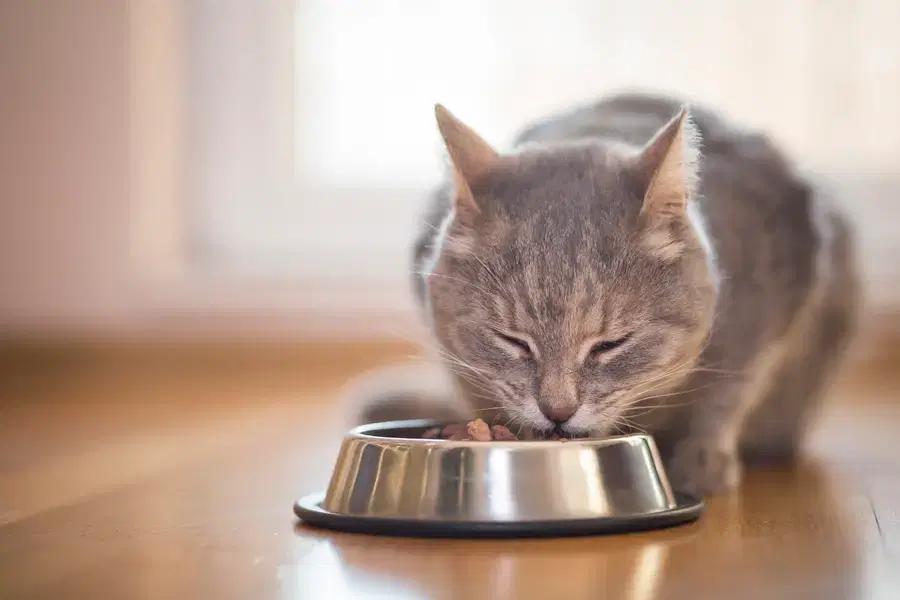Raisins have been a part of the human diet for thousands of years going back to the ancient Egyptians, Greeks, and Romans. Today, the United States, Turkey, and Iran are the largest producers of this dried fruit. The majority of raisins produced in the US come from California, particularly the San Joaquin Valley, which has a climate ideal for grape cultivation and drying.
Should You Give Your Cat Raisins?
No. Raisins are toxic to cats and should not be given to them at all. But before going ahead and hiding all the raisins from your kitty’s reach, it is important to understand the reasons why and what to do if your cat does end up eating raisins. Keep reading to learn more!
Do Cats Like Raisins?
Raisins are usually paired with nuts, cheese, and other dried fruits to add a sweet and chewy element to the spread. Cats lack the taste buds that detect sweetness; humans only have it because of a genetic mutation. You may find your cat being nosy about the foods you’re eating, but they most likely won’t care much about your raisins or grapes.
Nutritional Value of Raisins
On average, 100 grams of raisins would consist of the following –
Calories: 299 kcal
Carbohydrates: 79 g
Sugars: 59 g
Protein: 3.1 g
Fat: 0.5 g
Fiber: 3.7 g
Potassium: 749 mg
Iron: 1.9 mg
Calcium: 50 mg
Vitamin C: 2.3 mg
Vitamin K: 3.5 mcg
Vitamin B6: 0.1 mg
This looks like a nutritional power pack. That’s because raisins are healthy, for humans at least. They contain natural sugars which can provide energy to our bodies. The dietary fiber in them supports digestive health and potassium, which is important for heart and muscle function. The iron richness in them helps red blood cell formation and oxygen transport in the body.
Health Benefits of Raisins for Cats
There are no health benefits of raisins for cats despite there being multiple of them for us humans. This is because a cat’s digestive system is not the same as ours. Theirs is made primarily for digesting meat, not vegetables or fruits. This means that many fruits and vegetables are great for humans but toxic for our feline buddies.
Risks of Raisins for Cats
The potential health risks of raisins for cats include –
Kidney Damage: Raisins and grapes can cause acute kidney failure in cats. Symptoms such as vomiting, lethargy, decreased urination, and abdominal pain can be seen in such cases.1
Toxicity: Vets do not know the exact substance in raisins and grapes that causes toxicity in cats, but even small amounts of these fruits can have serious consequences for feline health.1
High Sugar Content: Cats shouldn't have raisins regardless, but even if they weren't toxic to cats, the high sugar content would not be suitable for cats with diabetes.
What Should You Do if Your Cat Eats a Raisin?
You should take action immediately if you suspect your cat has eaten a raisin. Even if you suspect that your cat has eaten a small raisin, you should be cautious and consult a vet right away. The symptoms of raisin poisoning in cats may include:2
Lethargy
Loss of appetite
Abdominal pain or discomfort
Decreased urination
Weakness
Dehydration
There are 2 things you can do to help ensure your cat is safe:
Veterinary Attention: If your cat ingests raisins or grapes by mistake, seek immediate veterinary attention. Prompt treatment is essential to help mitigate the effects of ingestion and prevent kidney damage.
Prevention: Keep the raisin jars and grape trays out of reach of cats and also make sure you avoid feeding them any foods that contain these ingredients. This includes being cautious about foods that may contain raisins or grapes as hidden ingredients as well.
Are Grapes Safe for Your Cat?
Raisins are a concentrated version of a grape. Grapes may contain less sugar and more water as compared to raisins, but they are equally toxic to cats and should be completely avoided.
Conclusion
Unfortunately, you may not be able to share the nutritional content of raisins and grapes with your furry friend. It may be very healthy for you to eat but is extremely toxic for your cat. We recommend you keep the raisins away from the reach of your cat and seal them in a tight container. Also, avoid feeding them any food that could contain them as an ingredient in any form.

With 15 years as a dog and cat parent, my pet articles are a mix of humor and firsthand experience - proof that the best stories often come with paws and purrs.
*Jan 2019 to Aug 2024 Spot Pet Insurance Services, LLC claims data.
“Can Cats Eat Grapes or Raisins?” Litter Robot, https://www.litter-robot.com/blog/can-cats-eat-grapes-or-raisins, Dec. 8, 2023.
"100 G Raisins," FatSecret, n.d., https://www.fatsecret.com/calories-nutrition/generic/raisins.
“Raisin Poisoning in Cats,” Wag Walking, https://wagwalking.com/cat/condition/raisin-poisoning-in-cats, Nov. 20, 2022.
The information presented in this article is for educational and informational purposes only and does not constitute or substitute for the advice of your veterinarian.











